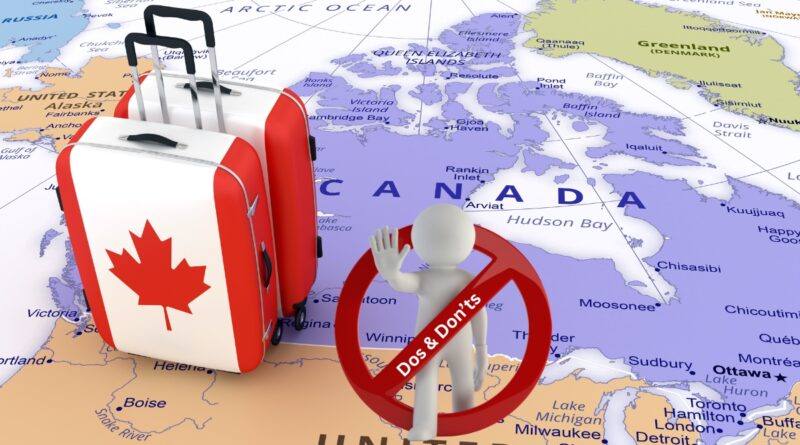Dos And Don’ts You Need To Know: New Immigrants To Canada
Dos and Don’ts for Immigrants Coming to Canada: A Guide to Everyday Etiquette. (Part One of Three)
Starting a new life in Canada is both exciting and challenging. It marks the beginning of fresh opportunities, new connections, and personal growth. However, beyond the paperwork and logistics lies one of the most essential aspects of genuinely settling in: understanding and adapting to Canadian culture. What is considered polite, regular, or respectful in one country may be perceived very differently here. Everyday situations—such as how you greet someone, speak on public transportation, or show up for a meeting—carry unspoken social rules that shape how you’re perceived and how smoothly you integrate.
Being aware of these cultural nuances not only helps you feel more confident but also makes a positive impression on those around you. Whether you’re navigating public spaces, entering the workforce, or simply building a community, understanding local etiquette plays a significant role in your journey. Here are some essential Dos and don’ts to help you settle in respectfully, professionally, and confidently as you begin your life in Canada.
1. Be Considerate in Public Spaces and on Public Transport
Canada places a high value on personal space and public courtesy. Avoid carrying large backpacks in crowded areas. If necessary, bring them in front of you by hand so you don’t unintentionally bump others, especially on public transport.
Don’t place bags on seats—they’re meant for people. Also, be aware of blue seats on buses and trains; these are reserved for seniors, pregnant individuals, or those with disabilities. Use the regular (usually red or grey) seats if you’re non-disabled.
Avoid video calls or loud conversations in public, and keep your media volume to a minimum by using headphones. Loud talking or extended phone calls in public are considered disruptive. Additionally, personal hygiene is crucial—using deodorant daily helps maintain freshness, especially in shared spaces.
2. Drop the “Sir”: Understand Workplace Etiquette
Unlike some countries where “Sir” or “Madam” are common signs of respect, in Canada, the term “Sir” is rarely used unless someone holds a royal title. In most workplaces, including call centers and customer service roles, it’s more common and acceptable to use first names or, in formal settings, Mr./Ms. + last name. Using “Sir” casually can sound overly formal or outdated, and adjusting to this norm shows cultural awareness and professional adaptability.
3. Time is Respect: The Importance of Punctuality
Punctuality is a cornerstone of Canadian culture, a sign of respect for others’ time. Whether it’s a job interview, a business meeting, or simply arriving at work, being on time is not just expected, it’s a must.
Aim to arrive at least 15 minutes early for meetings to ensure you have ample time. Use tools like Google Maps to calculate your travel time, and always factor in traffic and parking time, especially when driving. If you’re delayed for any reason, communicate promptly and clearly. A vague excuse like “traffic” is not sufficient unless it’s a major, unavoidable event. Keep in mind that being late without notice is often perceived as a sign of poor planning or a lack of respect.
4. Do Respect Personal Space
In Canada, personal space is highly respected. Whether in lines, on public transport, or even during conversations, maintaining a healthy distance of about an arm’s length from others is a sign of respect for their comfort. Avoid standing too close or leaning in, as it may make people uncomfortable and can lead to strained interactions.
5. Dress Appropriately for the Setting
How you dress is a reflection of your respect for the setting and the people around you. For most workplaces, business casual attire is the norm. In public, dressing neatly and appropriately for the weather is not just expected, it’s a sign of your professionalism. Being clean and presentable is more important than being fashionable. Avoid wearing overly casual or revealing clothing in professional or formal settings.
6. Do Say “Please” and “Thank You” Often
Courtesy is part of daily life in Canada. Phrases like “please,” “thank you,” “excuse me,” and “sorry” are used frequently and sincerely. Using these words can make interactions smoother and shows basic respect. Not using them can come across as impolite, even if unintentional.
7. Don’t Cut Lines (Queues)
Lining up is a big deal in Canada. Whether it’s at a coffee shop, government office, or bus stop, cutting in line is a significant breach of etiquette. Always wait your turn patiently. If you’re unsure, please ask politely where the line begins, for example, ‘Excuse me, is this the start of the line?’
8. Learn About Waste Sorting and Recycling
Canada is environmentally conscious, and many cities have separate bins for garbage, recycling, and compost. Before tossing something away, take a moment to read signs and understand local waste-sorting rules. Throwing everything into one bin may be considered irresponsible and, in some cases, could result in fines.
9. Don’t Assume Everyone Shares Your Views
Canada is a proudly multicultural nation that values diversity and freedom of belief. Be respectful when discussing religion, politics, or personal opinions, especially in the workplace or with new acquaintances. These topics can be sensitive, so it’s best to listen openly and avoid making strong assumptions or statements.
10. Do Tip at Restaurants and Salons
In Canada, tipping is not optional—it’s a cultural norm. At restaurants, cafes, salons, or when taking a taxi, the standard tip is around 15–20% of the total bill. Failing to tip can come across as rude or disrespectful, primarily since many service workers rely on tips to supplement their income.
Final Thoughts
Canada offers an inclusive and respectful society where diversity is celebrated and individual rights are respected. Understanding these cultural nuances can make your transition smoother and more fulfilling. These Dos and don’ts are just a starting point—there’s so much more to learn and experience as you settle in.Stay tuned for next month’s article, where I’ll dive deeper into other aspects of Canadian culture, workplace etiquette, and social norms that can help you feel more at home.
Part Two of Three (May Edition)

In the first part of this series, we delved into the foundational etiquette rules that can aid newcomers in adapting to Canadian society. These include punctuality, personal space, polite conversation, and public behavior. However, it’s equally crucial to grasp the deeper, less obvious social cues that shape everyday interactions in Canada. Understanding these unspoken rules is not just a matter of etiquette, but a key to avoiding social missteps and thriving in the community.
As you continue to settle in, it’s crucial to tune in to these subtleties. Not only will this help you avoid social missteps, but it will also empower you to thrive, build lasting relationships, and become an integral part of the community with confidence and grace.
Here are more practical dos and don’ts to help you navigate the unspoken rules of Canadian life in your daily interactions.
1. Do Acknowledge People with a Smile or a Nod
Canadians are generally friendly but not overly expressive in public. A simple smile, wave, or nod is a common way to greet neighbors, cashiers, or passersby—even if you don’t know them personally. It’s a small gesture that reflects approachability and warmth.
Don’t ignore someone entirely if you’ve made eye contact—it might come across as cold or dismissive. A subtle greeting goes a long way.
2. Don’t Interrupt During Conversations
In professional settings, classrooms, and even casual gatherings, waiting your turn to speak is a sign of respect. Canadians often pause before responding, and overlapping speech is generally avoided.
Do allow space in conversations and listen actively. If you want to add a point, phrases like “Just to add to that…” or “May I jump in for a second?” are polite ways to engage.
3. Do Hold the Door (Even for Strangers)
One small but significant social courtesy in Canada is holding the door open for the person behind you, even if they’re a stranger. This simple act of kindness can go a long way in making others feel valued and respected.
Don’t let the door swing shut behind you if someone’s just a few steps away. It’s a moment that can signal either kindness or carelessness.
4. Don’t Ask Personal Questions Too Soon
In many cultures, asking about someone’s age, salary, relationship status, or religion may be expected. In Canada, however, these topics are often considered too personal, especially in the early stages of a relationship or in a professional setting.
Do keep the conversation light when meeting someone for the first time. Ask about general interests, hobbies, or the weather (a classic Canadian go-to).
5. Wait to Be Seated at Restaurants
In some countries, taking a seat is common. In Canada, however, especially at full-service restaurants, you’re expected to wait to be seated by a host or server.
Don’t just walk in and choose a table unless there’s a clear “Please seat yourself” sign. Following this small protocol shows respect for the establishment and its staff.
6. Respect Quiet Hours in Residential Areas
In many Canadian cities and towns, designated quiet hours are in effect, typically between 10:00 PM and 7:00 AM, during which loud noises, such as music, vacuuming, or parties, are discouraged or even forbidden.
Don’t assume your home is a noise-free zone—walls and ceilings can be thin, especially in apartments and condos. Be considerate of your neighbors, and keep volume low during nighttime hours.
7. Don’t Bring Strong-Smelling Food to the Workplace
Canada’s multiculturalism means diverse food is celebrated—but in shared spaces like offices, sensitivity to smells is a real thing. Dishes with strong spices or ingredients (like fish or fermented foods) may linger and bother others.
Do enjoy your meals, but be mindful of reheating potent dishes in common areas. Use proper containers, clean up thoroughly, and ventilate if necessary.
8. Take Responsibility for Mistakes
In Canadian workplaces, owning up to an error is viewed as a mature and professional approach. It builds trust and accountability. You’re not expected to be perfect, but you are expected to be honest and proactive.
Don’t make excuses or blame others. A simple, “That was my oversight; I’ll fix it right away,” earns more respect than defensiveness or silence.
9. Don’t Assume Gender or Use Gendered Terms Casually
Inclusivity is a core value in Canadian culture. When referring to people, especially in professional or public settings, avoid assuming gender pronouns or using gendered greetings, such as “ladies and gentlemen.”
Do use neutral terms like “everyone,” “folks,” or “team,” and when unsure, ask someone’s pronouns respectfully. Many workplaces encourage or include this practice in email signatures and introductions.
10. Do Be Inclusive in Group Settings
Whether it’s a work lunch, a neighborhood event, or a team outing, inclusivity matters. This means inviting everyone involved—not just those you’re close with. Exclusion, even unintentional, can come across as cliquish or cold. By being inclusive, you show empathy and understanding, making everyone feel valued and respected.
Avoid forming tight circles in shared spaces or speaking in languages that the group does not understand unless everyone is included. Making people feel welcome is a sign of emotional intelligence and cultural sensitivity.
Final Thoughts
As you’ve probably discovered by now, adapting to life in Canada isn’t just about learning new systems—it’s about tuning into the unspoken social rhythms that define everyday interaction. These etiquette tips are part of a broader cultural tapestry that values respect, inclusion, and consideration for others, fostering a sense of connection and integration. This article is part of a three-part series designed to equip you with the knowledge and skills necessary to navigate Canadian social norms. Our goal is to ensure you feel fully prepared and confident to thrive in every aspect of Canadian life. Stay tuned for next month’s final installment, where we’ll explore even more real-life situations—such as networking events, online behavior, elevator etiquette, and how to decline an invitation politely.
End of Part Two…
Part Two of Three (May Edition)

Welcome to the final part of our three-part series designed to help newcomers understand the subtle but meaningful social norms that shape life in Canada. While Parts One and Two covered essentials such as punctuality, polite communication, personal space, and workplace etiquette, this final installment delves even deeper into unspoken expectations, inclusive behavior, and everyday cultural awareness.
By now, you’ve likely realized that adapting to a new country involves more than just learning the language or finding a job—it’s also about tuning into the values and behaviors that make people feel respected, seen, and comfortable around you.
Here are ten more etiquette tips that can help you build deeper connections, make a good impression, and feel genuinely at home in Canadian society.
1. Don’t Assume the Gender of Someone’s Spouse
Canada is an inclusive country where same-sex marriage has been legal since 2005. It’s important not to assume someone’s partner is of the opposite gender or use gender-specific terms unless they’ve already shared that information.
Use neutral language, such as “partner” or “spouse,” in conversation, especially in professional or polite settings. This simple shift demonstrates respect for diversity and helps create a welcoming environment for everyone.
2. Do Engage in Small Talk
In Canada, small talk is not just a formality; it’s a crucial tool for building rapport and facilitating smooth conversations. Discussing the weather, sports, current events, or weekend plans is not just normal—it’s a way to connect with others and feel part of the community.
Don’t jump straight into deep or personal topics with someone you’ve just met. Small talk is the Canadian way of warming up a conversation before moving to more substantial matters.
3. Do Volunteer Your Time
Volunteering is not just a significant part of Canadian culture; it’s a way to actively engage with your new community and demonstrate your commitment to good citizenship and community spirit. It’s also a great way to gain local experience, build networks, and show your willingness to contribute.
Do explore opportunities at local non-profits, community events, or cultural organizations. Volunteering helps you gain local experience, build networks, and demonstrate your willingness to contribute.
4. Cover Your Mouth When Yawning or Coughing
Personal hygiene and public health etiquette are important in Canada. Coughing, sneezing, or even yawning without covering your mouth can be perceived as impolite or careless.
Do use your elbow or a tissue—never your hands. It’s a simple yet vital way to show respect for those around you, especially in shared spaces like offices, public transportation, or elevators.
5. Don’t Show Up Unannounced
In many cultures, surprise visits are a sign of affection. In Canada, however, dropping by someone’s home uninvited is considered intrusive, even among friends.
Do send a quick message or call to ask if it’s a good time before visiting. This shows respect for people’s privacy and personal schedules.
6. Stand on the Right Side of Escalators
In crowded public areas, such as subway stations or malls, stand on the right side of the escalator if you’re not walking. This allows others to pass on the left.
Don’t block both sides of the escalator—it’s an unspoken rule, but one that is widely followed. Being mindful of this habit reflects awareness and courtesy.
7. Don’t Brag or Oversell Yourself
Canadians value humility. Confidence is appreciated, but boasting or exaggerating achievements can be seen as arrogant or insecure.
Do express your strengths in a grounded, modest tone. Focus on contributions, collaboration, and continuous learning rather than self-promotion.
8. Do Use Gender-Inclusive Language
Inclusivity is not just encouraged—it’s often expected. Avoid gendered greetings like “ladies and gentlemen” in group settings.
Do use terms like “everyone,” “team,” or “folks.” If unsure of someone’s gender identity or pronouns, it’s okay to ask or observe how others address them respectfully.
9. Don’t Interrupt Conversations
In Canada, active listening is a sign of respect. Cutting someone off mid-sentence or dominating conversations is frowned upon.
Do wait for pauses, and use phrases like “May I add something?” to join the discussion. This applies to meetings, casual chats, and even debates.
10. Do Respect Noise Levels in Shared Spaces
Whether you live in an apartment, attend a group class, or work in an open office, being mindful of your noise level is not just a rule- it’s a way to show consideration and respect for those around you. Loud music, phone calls, or shouting across rooms can be disruptive, so it’s important to use headphones, keep your voice low in shared environments, and avoid unnecessary noise.
Do use headphones, keep your voice low in shared environments, and avoid unnecessary noise—especially during early mornings or late nights.
Final Thoughts
Cultural etiquette is more than just a checklist—it’s about respecting differences, being mindful of your surroundings, and engaging with empathy. Throughout this three-part series, we’ve explored the many layers of Canadian social norms, from public transit to workplace interactions, inclusive language, and subtle day-to-day gestures that carry meaning.
As a newcomer, adopting these practices not only helps you fit in but also builds bridges, nurtures trust, and enhances your personal and professional life in Canada.
Remember: integration is a journey, not a race. Continue to observe, learn, and show up with respect and openness. You’re doing great—and the best is yet to come.





